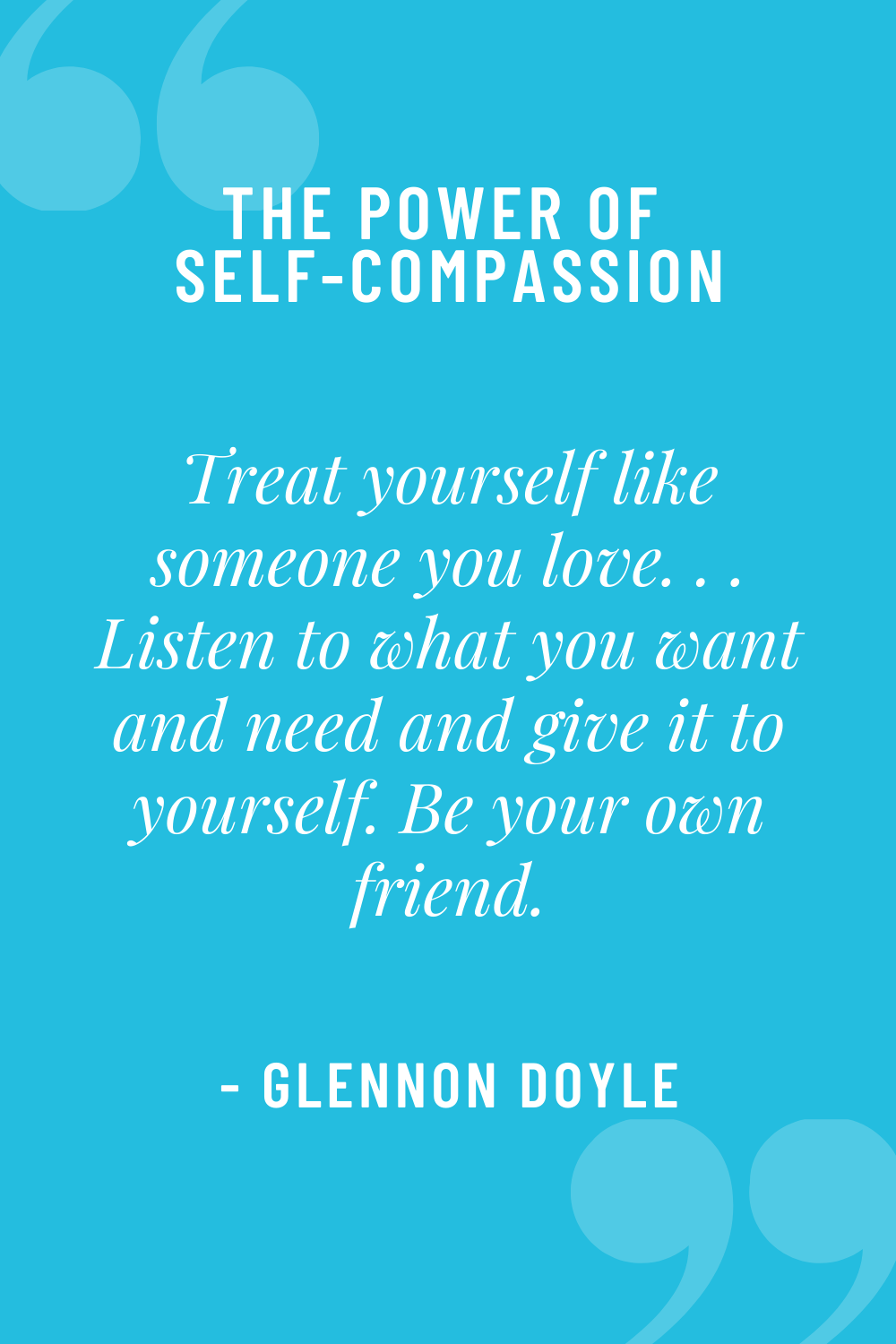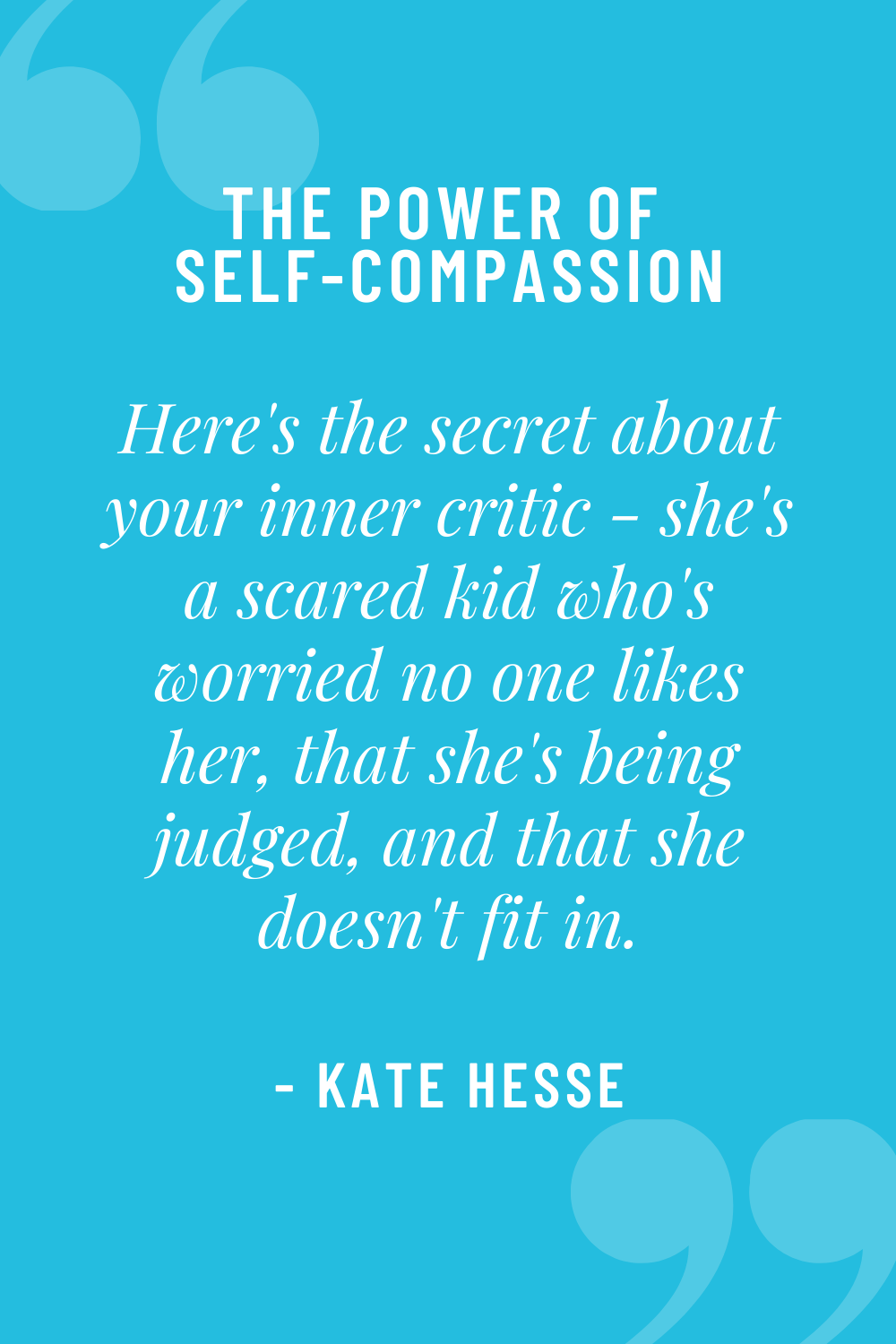
From childhood, we’re encouraged to be kind. Treat others the way we want to be treated ourselves. However, we rarely hear how incredibly important it is to turn that kindness back onto ourselves. Self-compassion is affording yourself the same grace and understanding you give to others.
Stop shoulding all over yourself. . .
I have an amazing yoga teacher who often reminds students to stop “shoulding all over themselves”. Say that out loud. Pause. Right – yes, it does sound an awful lot like a slightly more colorful expression. And it’s one of my life mantras.
Sometimes I find myself feeling overwhelmed by a to-do list which only seems to grow longer. Then my critical inner voice pipes up – “I should be able to do more today”, “I should have these things taken care of”, “I should be doing better than this”.
When I start hearing those “shoulds”, I take a deep breath, remind myself to stop shoulding all over myself, and then I put the list face-down and go do something really nice and indulgent for myself to refill my cup.
 . . . and make sure you keep your teacup filled
. . . and make sure you keep your teacup filled
I want you to imagine you’re holding a beautiful tea cup sitting in a lovely saucer.
You’re pouring tea into the cup from a teapot, you’re pouring so much tea into the cup that it’s spilling over and filling the saucer.
What you have to give to others – that’s the tea in the saucer, the tea in the teacup – that’s what you keep for yourself. When I start hearing my inner critic chime in, it usually means I’ve drained my saucer and my teacup is emptying as well.
Be your own best friend
I love the way Glennon Doyle in Love Warrior puts this often heard piece of advice: “Treat yourself like someone you love. . . Listen to what you want and need and give it to yourself. Be your own friend.”
If your friend came to you and said she felt overwhelmed by her to-do list, she was tired and worn out, and just couldn’t seem to make headway. What would you say?
I know I would never talk to her the way I sometimes let my inner critic talk to me.
I would suggest my friend carve out some time ASAP for a little self-care. That she be compassionate with herself. I would encourage her to remember that we’re all human – not superhuman – and no one can do it all. And I would remind her that it’s ok to let some things slide today if it means making time to restore yourself so you’re ready to tackle them tomorrow.
Quieting your inner critic
If you’re like me, your inner critic may have a lot to say – she doesn’t only tell me about what I should (or shouldn’t) be doing, she also likes to remind me of what I am (and am not). She knows all my insecurities and likes to prey on them when she finds a weak moment. And once I let her start talking, it becomes much harder to get her to stop.
 But I’ve found two things which make a big difference. The first is keeping my cup full.
But I’ve found two things which make a big difference. The first is keeping my cup full.
When I’m feeling my best – rested, nourished, relaxed, at ease, it’s a lot harder for my inner critic to control the conversation.
The second is becoming more aware of what my inner critic sounds like so once I hear her start talking I’m able to react before she begins to dominate the conversation.
Here’s the secret about your inner critic – she’s a scared kid who’s worried no one likes her, that she’s being judged, and that she doesn’t fit in. She’s one of the voices of your fear, trying to keep you safe by avoiding anything that feels like too much.
So try treating her just like you would any other scared kid. Give her a mental hug, reassure her that she’s loved, that she’s safe, and that everything is going to be ok.
Meditation, yoga, journaling and other forms of self-care and self-work are incredibly helpful in quieting your inner critic. (Read my post on the difference between self-work and self-care and the importance of both.)
The fine line between self-compassion and procrastination
It’s important to be aware of the fine line between self-compassion and procrastination. When you find yourself avoiding certain things, try to look at them objectively. Are you avoiding them because you truly don’t have enough tea in your saucer or teacup to deal with them? Or are you avoiding them because they’re edgy and uncomfortable?
Feeling depleted is a great reason for self-compassion, for allowing yourself to recharge. But tackling those edgy and uncomfortable things – that’s where the magic happens.
In Hatha yoga, we often take poses to the edge and hold them. You shouldn’t feel pain, but, in going to your edge, and then staying there, finding the ease in an uneasy pose, you’re able to stretch, to grow, to reach places you didn’t think you could before.
Sometimes literally – you might be able to reach your toes when a few months before you couldn’t. But often it’s metaphorical. If you can stay in the edgy and uncomfortable place during your asana, you can do it in the rest of your life as well. Things that once seemed too scary, start to look a little more doable.
 We’re all works in progress
We’re all works in progress
I saw a post on a social media feed recently which said something along the lines of “I teach what I need to learn”. This blog post is a prime example of that. I’m a work in progress.
There are times when my inner critic starts chattering away and dominates my inner dialogue – spending hours or days criticizing me. And there are also times when I allow myself to procrastinate under the guise of self-compassion.
Today is a great example of that. I didn’t sleep well last night, I woke up tired and it was snowing. So I let myself curl up on the sofa and read for a few hours this morning instead of practicing my asana, or getting to work, or taking care of a dozen other things on my to-do list.
I tried to tell myself it was compassionate – I was tired. But really, I know I would feel more energized (not less) if I did my asana – I just wanted to have a snow day.
So I got another opportunity to practice more self-compassion – instead of letting my inner critic start criticizing me for procrastinating, I took a few deep breaths, let the morning go, and refocused myself for the rest of the day.
Learning what your inner critic sounds like
The critical voice inside your head may not sound like mine – we each have our own stories we carry with us – your critical voice will be talking to you from the book of your stories. What’s important is you learn to recognize that voice. Just like your critical voice will be unique to you, the tools to help you recognize and quiet that voice will also be what works for you.
Once you can hear the critical voice in your head as something other than the truth, you can begin to turn your attention elsewhere. Focusing instead on what you truly need and remembering that self-compassion is an essential part of achieving balance and well-being.
If you need help learning to recognize your inner critic and developing tools to quiet her, I would love to help! Through my Individual Coaching Program, I’ll guide you on your journey to quiet your inner critic and create your inner sanctuary. Schedule a no-cost Discovery Session today and let’s start the conversation!
Related
4 thoughts on “Self-Compassion – a powerful tool for wellbeing”
Leave a Reply Cancel reply
This site uses Akismet to reduce spam. Learn how your comment data is processed.
[…] you have a week where you struggle, remember to be kind to yourself! Read this post on the art & importance of self-compassion if you need a refresher. Then get out your journal […]
[…] you’re struggling with this process, check out my posts on: radical honesty and self-compassion to help you tune into the voice of truth inside you while tuning out your inner critic. […]
[…] and your teeth gritted, or are you sitting easily in your chair? Is your mind spinning, has your inner mean girl started to chatter, or are you calm and at […]
[…] you’ll find that negative self-talk or unconscious beliefs are undermining your ability to achieve your goals (check out the linked […]